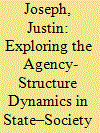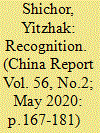|
|
|
Sort Order |
|
|
|
Items / Page
|
|
|
|
|
|
|
| Srl | Item |
| 1 |
ID:
172300


|
|
|
|
|
| Summary/Abstract |
China’s political, economic and cultural influence is steadily rising in Fiji and the Pacific region as a whole. The Sino–Fiji cooperation deepened at multiple levels after the Fijian military assumed power through a coup d’état and removed the civilian government from power in late 2006. This ‘undemocratic behaviour’ infuriated the two regional powers—Australia and New Zealand who then applied sanctions on Fiji, particularly the military brass, and encouraged their counterparts as well as multilateral aid organisations to ‘punish’ Fiji’s military ‘regime’. The military government in order to derail the impact of sanctions from its traditional donors adopted the ‘Look North Policy’, which was opening cooperation with China and attracting Chinese investment in Fiji. China welcomed the friendship gesture and furnished Fiji with financial assistance. This Chinese friendship was also due to Taiwanese involvement in the region, which was providing aid for diplomatic recognition and support at the UN. The ‘microstates’ hold about 7 per cent of UN votes. Both China and Taiwan need their votes at multilateral organisations and given that these microstates are mostly aid-dependent economies, initiated an era of Chequebook diplomacy, which is basically money for diplomatic recognition in the case of Taiwan or acceptance of One China Policy in the case of China. The microstates have time and again switched between China and Taiwan and played one against the other to get more aid money out of their diplomatic rivalry. The Sino–Taiwan aid competition in the Pacific forced US to make a strong comeback and ensure that China under the pretext of denying Taiwan space in the region actually spies on the US activities in the region. As a result, the US and its regional allies have significantly increased their foreign aid to the island nations in order to coax them to diminish their level of financial dependence on China. So far, they have not been successful enough and China’s aid package has gone far beyond the level US is giving. Today, China is the second largest donor to the region and largest financier to Fiji. Fiji has become the ace in this game as it is the regional hub of the Pacific Island states. Bearing the current high level of aid competition between traditional and emerging donors in mind, it is too early to judge whether Chinese aid will cause more harm to Fiji than benefit or vice versa. It also entirely depends on the Fijian government as to how much it relies on Chinese aid and how clean Chinese are with their soft loans. China has been blamed for not being clear and specific about the terms and conditions of its concessional loans. This vagueness and secrecy that is associated with Chinese aid been a cause for concern, especially among traditional donors.
|
|
|
|
|
|
|
|
|
|
|
|
|
|
|
|
| 2 |
ID:
172301


|
|
|
|
|
| Summary/Abstract |
Ranking alongside the top bicycling nations of the world, Japan today boasts of a deeply engrained cycling culture. While the technological prowess of Japan’s bicycle industry is well known, there exists no scholarly study investigating the socio-cultural impact of cycling in Japan, specifically its role in emancipation of women. How the modern women of Japan scaled barriers to mobility riding their way to modernity in an oppressive male-dominated society is not yet known. The objective of this paper is to examine women cyclists in Japan in the context of modernisation. On the one hand, viewing bicycles helps examine the Japanese economy from the perspective of ordinary women as active consumers (as against their passive image) whose demand for bicycles was certainly an essential ingredient for the growth of bicycle industry. On the other hand, it serves to question the predominant view of consumption stagnation in interwar Japan. Most importantly, as countries around the world continue to make laudable efforts to encourage women cyclists, a leaf can be drawn by policymakers from the history of forgotten cycling heroines of Japan to accelerate women’s socio-economic empowerment.
|
|
|
|
|
|
|
|
|
|
|
|
|
|
|
|
| 3 |
ID:
172295


|
|
|
|
|
| Summary/Abstract |
Based on the data from the 13-month field visit spread over two trips (September 2016 to December 2016 and September 2017 to July 2018), this study highlights how securitisation efforts from the central government interact with environmental non-governmental organisation (ENGO) activism and advocacy in China, producing diverse outcomes across temporal and spatial dimensions. The trajectory of state–society relations in the context of environmental governance depends on (a) the ability of party-state to control ‘new media’ activism and manage ENGO advocacy to ‘maintain stability/rule by law’ and (b) ability of the assemblage of media activism and ENGO advocacy, along with other agents, to support the transition from ‘rule by law’ to ‘rule of law’. The overall findings are discussed in the context of the ‘Copenhagen School’ framework in International Relations Theory to examine the process of securitisation in the environmental sector in China. The securitising actor (the one who leads the process of securitisation such as States), referent object (the object under existential threat, i.e. human nature harmony) and functional actors (those who support or oppose the process of securitisation, i.e. ENGOs) are the major players involved.
|
|
|
|
|
|
|
|
|
|
|
|
|
|
|
|
| 4 |
ID:
172297


|
|
|
|
|
| Summary/Abstract |
Faced with the explosion of information about many other countries in the world on social media, the audience of a certain country may form different emotions, judgements and thoughts of such information, which are worthy of scrutiny. In this article, our aim is to examine Western users’ opinions towards China-related posts on Reddit.com through sentiment analysis of the comments following such posts. Using a statistical method, we collected and analysed the comments of 384 posts on China on Reddit.com, which were distributed in 36 subreddits. As the finding shows, the number of neutral comments exceeds the number of either positive comments or negative comments on China-related posts on Reddit.com. The results indicate that although most of the opinions on Reddit.com about China are neutral or irrelevant, they are largely neglected by the users or viewers who very much prefer negative or positive comments. Therefore, the perceptions on these opinions could be skewed due to this effect. In addition, for the citizens of any country, except for those who intentionally try to guide the direction of discussion on a topic, it is very unlikely for them to be really concerned or care about the events and incidents happening in another remote country.
|
|
|
|
|
|
|
|
|
|
|
|
|
|
|
|
| 5 |
ID:
172294


|
|
|
|
|
| Summary/Abstract |
This paper provides a framework for China’s gradual global integration. From historical exclusion, China became initially and partly incorporated to the world in the 1950s and 1960s while ignored by most of the countries. A quantitative breakthrough in the 1970s has led to a universal recognition, still formal and restricted throughout the 1980s and 1990s, making China a great power by the early twenty-first century. China’s rise and gradual integration in the international community is interpreted here based on Marx’s theory of ownership and Professor Charles Taylor’s theory of recognition. Both regard status as a property which is an outcome not just of a unilateral individual claim but of multilateral social relations. Adapted to the international society, these theories underscore China’s global integration. Therefore, China is now entitled to, and capable of, playing a more active and, moreover, leading global role, not just because of its unilateral claims and remarkable achievements, but also, and perhaps much more, because of its multilateral recognition—not in the formal diplomatic sense—of China’s entitlement and capabilities of doing it. Also, in addition to joining, and occasionally heading, international organisations, China introduced its One Belt One Road initiative as a unique contribution of a model for the West, and especially for less-developed countries. While it is post-Mao China’s domestic reform which attract most international attention and are regarded a revolutionary breakthrough with the past, the real and most innovative breakthrough is China’s integration in the world. Domestic reforms were undertaken throughout Chinese history; international integration is new and unprecedented.
|
|
|
|
|
|
|
|
|
|
|
|
|
|
|
|
| 6 |
ID:
172299


|
|
|
|
|
| Summary/Abstract |
This article takes an empirical approach to Turkey’s perceptions of China’s proposal to build a Community of a Shared Future for Mankind and begin the Belt and Road Initiative (BRI) by examining data from Turkey’s mainstream media, think-tanks, academic and business fields, and social media sources. The findings demonstrate that, despite Turkey’s geological position, the degree of concern for a Community of a Shared Future and the BRI is not high enough. There are positive and negative evaluations. The positive evaluation is mainly related to the importance of BRI with regard to Turkey’s economy, business, infrastructure construction and the national rejuvenation, while the negative side is about China’s aim, cultural security and the disputes between the two countries. To deal with such cognitive differences, China needs to boost the publicity of the initiative and form a better understanding about Turkish domestic needs. China and Turkey should also seek to strengthen people-to-people ties.
|
|
|
|
|
|
|
|
|
|
|
|
|
|
|
|
|
|
|
|
|